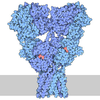[English] 日本語
 Yorodumi
Yorodumi- PDB-7mly: Cryo-EM reveals partially and fully assembled native glycine rece... -
+ Open data
Open data
- Basic information
Basic information
| Entry | Database: PDB / ID: 7mly | ||||||
|---|---|---|---|---|---|---|---|
| Title | Cryo-EM reveals partially and fully assembled native glycine receptors,heteromeric pentamer | ||||||
 Components Components |
| ||||||
 Keywords Keywords | MEMBRANE PROTEIN / SIGNALING PROTEIN / glycine receptor / ion channel / heteromeric pentamer | ||||||
| Function / homology |  Function and homology information Function and homology informationNeurotransmitter receptors and postsynaptic signal transmission / taurine binding / negative regulation of transmission of nerve impulse / positive regulation of acrosome reaction / acrosome reaction / synaptic transmission, glycinergic / glycine-gated chloride channel complex / gamma-aminobutyric acid receptor clustering / neuromuscular process controlling posture / extracellularly glycine-gated ion channel activity ...Neurotransmitter receptors and postsynaptic signal transmission / taurine binding / negative regulation of transmission of nerve impulse / positive regulation of acrosome reaction / acrosome reaction / synaptic transmission, glycinergic / glycine-gated chloride channel complex / gamma-aminobutyric acid receptor clustering / neuromuscular process controlling posture / extracellularly glycine-gated ion channel activity / righting reflex / regulation of respiratory gaseous exchange by nervous system process / extracellularly glycine-gated chloride channel activity / inhibitory synapse / excitatory extracellular ligand-gated monoatomic ion channel activity / glycinergic synapse / adult walking behavior / inhibitory postsynaptic potential / glycine binding / cellular response to zinc ion / startle response / cellular response to ethanol / chloride channel complex / neuropeptide signaling pathway / neuronal action potential / monoatomic ion transport / visual perception / ligand-gated monoatomic ion channel activity involved in regulation of presynaptic membrane potential / chloride transmembrane transport / muscle contraction / transmitter-gated monoatomic ion channel activity involved in regulation of postsynaptic membrane potential / cellular response to amino acid stimulus / GABA-ergic synapse / transmembrane signaling receptor activity / nervous system development / perikaryon / chemical synaptic transmission / postsynaptic membrane / external side of plasma membrane / intracellular membrane-bounded organelle / dendrite / zinc ion binding / cytoplasm Similarity search - Function | ||||||
| Biological species |   | ||||||
| Method | ELECTRON MICROSCOPY / single particle reconstruction / cryo EM / Resolution: 2.7 Å | ||||||
 Authors Authors | Zhu, H. / Gouaux, E. | ||||||
| Funding support |  United States, 1items United States, 1items
| ||||||
 Citation Citation |  Journal: Nature / Year: 2021 Journal: Nature / Year: 2021Title: Architecture and assembly mechanism of native glycine receptors. Authors: Hongtao Zhu / Eric Gouaux /  Abstract: Glycine receptors (GlyRs) are pentameric, 'Cys-loop' receptors that form chloride-permeable channels and mediate fast inhibitory signalling throughout the central nervous system. In the spinal cord ...Glycine receptors (GlyRs) are pentameric, 'Cys-loop' receptors that form chloride-permeable channels and mediate fast inhibitory signalling throughout the central nervous system. In the spinal cord and brainstem, GlyRs regulate locomotion and cause movement disorders when mutated. However, the stoichiometry of native GlyRs and the mechanism by which they are assembled remain unclear, despite extensive investigation. Here we report cryo-electron microscopy structures of native GlyRs from pig spinal cord and brainstem, revealing structural insights into heteromeric receptors and their predominant subunit stoichiometry of 4α:1β. Within the heteromeric pentamer, the β(+)-α(-) interface adopts a structure that is distinct from the α(+)-α(-) and α(+)-β(-) interfaces. Furthermore, the β-subunit contains a unique phenylalanine residue that resides within the pore and disrupts the canonical picrotoxin site. These results explain why inclusion of the β-subunit breaks receptor symmetry and alters ion channel pharmacology. We also find incomplete receptor complexes and, by elucidating their structures, reveal the architectures of partially assembled α-trimers and α-tetramers. | ||||||
| History |
|
- Structure visualization
Structure visualization
| Movie |
 Movie viewer Movie viewer |
|---|---|
| Structure viewer | Molecule:  Molmil Molmil Jmol/JSmol Jmol/JSmol |
- Downloads & links
Downloads & links
- Download
Download
| PDBx/mmCIF format |  7mly.cif.gz 7mly.cif.gz | 487 KB | Display |  PDBx/mmCIF format PDBx/mmCIF format |
|---|---|---|---|---|
| PDB format |  pdb7mly.ent.gz pdb7mly.ent.gz | Display |  PDB format PDB format | |
| PDBx/mmJSON format |  7mly.json.gz 7mly.json.gz | Tree view |  PDBx/mmJSON format PDBx/mmJSON format | |
| Others |  Other downloads Other downloads |
-Validation report
| Summary document |  7mly_validation.pdf.gz 7mly_validation.pdf.gz | 1.3 MB | Display |  wwPDB validaton report wwPDB validaton report |
|---|---|---|---|---|
| Full document |  7mly_full_validation.pdf.gz 7mly_full_validation.pdf.gz | 1.4 MB | Display | |
| Data in XML |  7mly_validation.xml.gz 7mly_validation.xml.gz | 87 KB | Display | |
| Data in CIF |  7mly_validation.cif.gz 7mly_validation.cif.gz | 127.4 KB | Display | |
| Arichive directory |  https://data.pdbj.org/pub/pdb/validation_reports/ml/7mly https://data.pdbj.org/pub/pdb/validation_reports/ml/7mly ftp://data.pdbj.org/pub/pdb/validation_reports/ml/7mly ftp://data.pdbj.org/pub/pdb/validation_reports/ml/7mly | HTTPS FTP |
-Related structure data
| Related structure data |  23913MC  7mluC  7mlvC M: map data used to model this data C: citing same article ( |
|---|---|
| Similar structure data |
- Links
Links
- Assembly
Assembly
| Deposited unit | 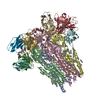
|
|---|---|
| 1 |
|
- Components
Components
-Glycine receptor ... , 2 types, 5 molecules DABCE
| #3: Protein | Mass: 51507.523 Da / Num. of mol.: 4 / Source method: isolated from a natural source / Source: (natural)  #4: Protein | | Mass: 56200.996 Da / Num. of mol.: 1 / Source method: isolated from a natural source / Source: (natural)  |
|---|
-Antibody , 2 types, 8 molecules JKMIGFLH
| #1: Antibody | Mass: 11743.124 Da / Num. of mol.: 4 Source method: isolated from a genetically manipulated source Source: (gene. exp.)   #2: Antibody | Mass: 12983.512 Da / Num. of mol.: 4 Source method: isolated from a genetically manipulated source Source: (gene. exp.)   |
|---|
-Sugars , 4 types, 5 molecules
| #5: Polysaccharide | alpha-D-mannopyranose-(1-2)-alpha-D-mannopyranose-(1-3)-beta-D-mannopyranose-(1-4)-2-acetamido-2- ...alpha-D-mannopyranose-(1-2)-alpha-D-mannopyranose-(1-3)-beta-D-mannopyranose-(1-4)-2-acetamido-2-deoxy-beta-D-glucopyranose-(1-4)-2-acetamido-2-deoxy-beta-D-glucopyranose | ||
|---|---|---|---|
| #6: Polysaccharide | alpha-D-mannopyranose-(1-3)-[alpha-D-mannopyranose-(1-6)]beta-D-mannopyranose-(1-4)-2-acetamido-2- ...alpha-D-mannopyranose-(1-3)-[alpha-D-mannopyranose-(1-6)]beta-D-mannopyranose-(1-4)-2-acetamido-2-deoxy-beta-D-glucopyranose-(1-4)-2-acetamido-2-deoxy-beta-D-glucopyranose | ||
| #7: Polysaccharide | | #8: Polysaccharide | beta-D-mannopyranose-(1-4)-2-acetamido-2-deoxy-beta-D-glucopyranose-(1-4)-2-acetamido-2-deoxy-beta- ...beta-D-mannopyranose-(1-4)-2-acetamido-2-deoxy-beta-D-glucopyranose-(1-4)-2-acetamido-2-deoxy-beta-D-glucopyranose | |
-Non-polymers , 11 types, 48 molecules 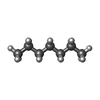
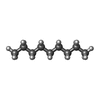
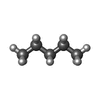
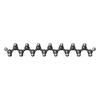
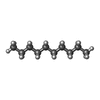

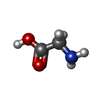
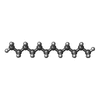
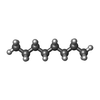
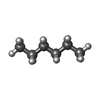
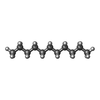










| #9: Chemical | ChemComp-HP6 / #10: Chemical | #11: Chemical | ChemComp-LNK / #12: Chemical | ChemComp-MYS / | #13: Chemical | ChemComp-D10 / | #14: Chemical | ChemComp-NBU / #15: Chemical | ChemComp-GLY / #16: Chemical | #17: Chemical | ChemComp-OCT / #18: Chemical | #19: Chemical | ChemComp-UND / | |
|---|
-Details
| Has ligand of interest | N |
|---|---|
| Has protein modification | Y |
-Experimental details
-Experiment
| Experiment | Method: ELECTRON MICROSCOPY |
|---|---|
| EM experiment | Aggregation state: PARTICLE / 3D reconstruction method: single particle reconstruction |
- Sample preparation
Sample preparation
| Component |
| ||||||||||||||||||||||||
|---|---|---|---|---|---|---|---|---|---|---|---|---|---|---|---|---|---|---|---|---|---|---|---|---|---|
| Molecular weight | Value: 0.5 MDa / Experimental value: YES | ||||||||||||||||||||||||
| Source (natural) |
| ||||||||||||||||||||||||
| Source (recombinant) | Organism:  | ||||||||||||||||||||||||
| Buffer solution | pH: 8 | ||||||||||||||||||||||||
| Specimen | Conc.: 0.05 mg/ml / Embedding applied: NO / Shadowing applied: NO / Staining applied: NO / Vitrification applied: YES | ||||||||||||||||||||||||
| Vitrification | Cryogen name: ETHANE |
- Electron microscopy imaging
Electron microscopy imaging
| Experimental equipment |  Model: Titan Krios / Image courtesy: FEI Company |
|---|---|
| Microscopy | Model: FEI TITAN KRIOS |
| Electron gun | Electron source:  FIELD EMISSION GUN / Accelerating voltage: 300 kV / Illumination mode: FLOOD BEAM FIELD EMISSION GUN / Accelerating voltage: 300 kV / Illumination mode: FLOOD BEAM |
| Electron lens | Mode: BRIGHT FIELD / Cs: 2.7 mm |
| Image recording | Electron dose: 28.2 e/Å2 / Film or detector model: GATAN K3 BIOQUANTUM (6k x 4k) |
- Processing
Processing
| EM software |
| ||||||||||||||||||
|---|---|---|---|---|---|---|---|---|---|---|---|---|---|---|---|---|---|---|---|
| CTF correction | Type: PHASE FLIPPING AND AMPLITUDE CORRECTION | ||||||||||||||||||
| Symmetry | Point symmetry: C1 (asymmetric) | ||||||||||||||||||
| 3D reconstruction | Resolution: 2.7 Å / Resolution method: FSC 0.143 CUT-OFF / Num. of particles: 527075 / Symmetry type: POINT |
 Movie
Movie Controller
Controller





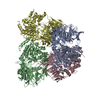

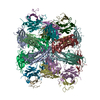



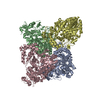

 PDBj
PDBj




